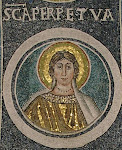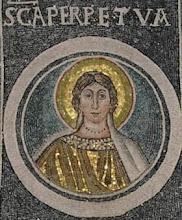Five Kernels of Corn by Norma Q Hare
(written in 1986 and slightly edited by Mary Mitchell in 2008)
It was a cold, gray day on November 15, 1620. The Mayflower rode at anchor near the shore, while a group of eager men set out in a small boat to explore the desolate, barren land to which they'd come. One of the first things they discovered near the beach was a deserted cornfield where the dry, broken stalks rustled in the sharp wind. Nearby they saw several strange mounds. Upon digging into one, they were amazed to find odd-looking, yellow, red and blue Indian corn. They took some with them to use of seed when they planted their crops in the spring. They couldn't know then how important that corn would prove to be to the colony's future.
They weren't prepared for that first dreadful winter, and there was much sickness. Nearly half the colonists died before spring finally arrived. Of those who survived, about half were children not yet sixteen years old; and only five married women remained.
When spring came, the men and boys planted 20 acres of Indian corn. Six additional acres they planted with the seeds they'd brought from England - wheat, rye, barley and peas - and there were vegetable gardens near the houses.
But to everyone's dismay, the seeds they'd brought failed to produce, being unsuited to the growing conditions in New England. The colonists worried whether they'd have enough food for the winter. Grain crops were necessary for their survival, for they provided the bread and puddings that gave them the energy they needed to work and endure the harsh conditions in which they lived, and the nourishment the children needed for adequate growth.
To supplement their store of grain, they learned, with help from the Indians, to catch the fish, to shoot the fowl and deer, and to harvest the wild fruits and berries that the forest and sea provided. They dried and preserved as much as they could in anticipation of another long winter with little grain.
In late fall, despite their small corn harvest, they felt confident and grateful for what they'd accomplished. They decided to celebrate what they called the Harvest Thanksgiving. They were joined by 90 of their Indian friends who stayed for three days enjoying their hospitality. This was an unexpected drain on their food supplies, but they believed that, by careful management, they would have enough to last until the next year.
The ship Fortune arrived a few days later. The happy Pilgrims expected to welcome members of their families and friends who had been left behind. They also believed the ship would bring food and other provisions they needed. They were distressed to learn, however, that it brought 35 colonists instead. Most of them were young men who brought no tools, bedding, or food, possessing little more than what they wore. There was nothing for the Pilgrims to do but to share their meager clothing, their homes and their precious food with the strangers. They also had to supply food to the sailors of the Fortune for their long voyage back to England.
For the next six months the colonists lived on half rations and every colonist knew daily hunger.As the months passed, every colonist knew daily hunger. During the summer they were thin and weak and staggered as they went about their work. They might have perished had they not been able to obtain some grain from the English fishing village further up the Maine coast.
While the year before had been very bad, the Starving Time came upon the little colony the spring of 1623. Tradition tells us that each person received only five kernels of parched corn a day. Governor Bradford wrote that they had neither bread nor corn for two or three months together, and their entire diet consisted of only fish and water.
To add to their misery, the early summer weather was hot and dry, and the corn began to wither. In desperation they went one day to the top of the hill to pray to God for relief. That night a soft rain began to fall, and the drought was broken. At harvest, every field produced an abundance of corn, with enough for everyone. After nearly three years, the famine was over.
During harvest season each year, it is customary for Mayflower Society members to remember the desperate privation and famine our ancestors endured during the first difficult years. Let these five kernels of corn -- the Indian corn that at first kept them alive and then became the staple upon which they prospered -- be a symbol to remind us of their bold, courageous dream. Let them also remind us of the legacy of our Pilgrim forefathers; the freedom to worship as we choose, a government by consent of the governed with just and equal laws, a recognition of the necessity for individual ownership and enterprise, the willingness and courage to fight for one's beliefs, and an everlasting trust in God.
You may be surprise by the claims at the end that the Mayflower pilgrims left such a wide ranging legacy.
The claim of the bequest of "a government by consent of the governed with just and equal laws" refers to the Mayflower Compact. Before landing at Plymouth rock, the adult male passengers on the Mayflower signed a document bearing these words:
In the name of God, Amen. We whose names are under-written, the loyal subjects of our dread sovereign Lord, King James, by the grace of God, of Great Britain, France, and Ireland King, Defender of the Faith, etc.
Having undertaken, for the glory of God, and advancement of the Christian faith, and honor of our King and Country, a voyage to plant the first colony in the northern parts of Virginia, do by these presents solemnly and mutually, in the presence of God, and one of another, covenant and combine our selves together into a civil body politic, for our better ordering and preservation and furtherance of the ends aforesaid; and by virtue hereof to enact, constitute, and frame such just and equal laws, ordinances, acts, constitutions and offices, from time to time, as shall be thought most meet and convenient for the general good of the Colony, unto which we promise all due submission and obedience. In witness whereof we have hereunder subscribed our names at Cape Cod, the eleventh of November [New Style, November 21], in the year of the reign of our sovereign lord, King James, of England, France, and Ireland, the eighteenth, and of Scotland the fifty-fourth. Anno Dom. 1620.
The claim that the Mayflower pilgrims bequested "a recognition of the necessity for individual ownership and enterprise" refers to failure of their early experiment with socialism. Originally, all the land that was cleared and all the structures built were to belong to the community. Everything that was produced was to go into ta common store with each member entitled to one equal share. Seeing that this economic system was a failure, the governor of the colony, William Bradford assigned a plot of land to each family and permitted them to market their own crops and other products. Bradford wrote:
So they began to think how they might raise as much corn as they could, and obtain a better crop than they had done, that they might not still thus languish in misery. At length, after much debate of things, the Governor (with the advice of the chiefest amongst them) gave way that they should set corn every man for his own particular, and in that regard trust to themselves. ... This had very good success, for it made all hands very industrious, so as much more corn was planted than otherwise would have been by any means the Governor or any other could use, and saved him a great deal of trouble, and gave far better content. The women now went willingly into the field, and took their little ones with them to set corn, which before would allege weakness and inability, whom to have compelled would have been thought great tyranny and oppression.
The experience that was had in this common course and condition, tried sundry years and that amongst godly and sober men, may well evince the vanity of that conceit of Plato's and other ancients applauded by some of later times; that the taking away of property and bringing in community into a commonwealth would make them happy and flourishing; as if they were wiser than God. For this community (so far as it was) was found to breed much confusion and discontent and retard much employment that would have been to their benefit and comfort. For the young men, that were most able and fit for labour and service, did repine that they should spend their time and strength to work for other men's wives and children without any recompense. The strong, or man of parts, had no more in division of victuals and clothes than he that was weak and not able to do a quarter the other could, this was thought injustice. … And for men's wives to be commanded to do service for other men, as dressing their meat, washing their clothes, etc., they deemed it a kind of slavery, neither could many husbands brook it. Upon the point all being to have alike, and all to do alike, they thought themselves in the like condition, and one as good as another; and so, if it did not cut off those relations that God hath set amongst men, yet it did at least diminish and take off the mutual respects that should be preserved amongst them.
For more on the Pilgrims and individual ownership, see American Thinker here.





No comments:
Post a Comment